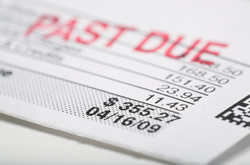 Most of the short sale sellers that we help are selling a home because of financial problems. They can't afford the payments and sell their home to avoid foreclosure. Because of this, I am very familiar with helping my customers who have financial problems. Many of them are struggling to buy groceries, keep the power turned on, and pay for gas to get to work.
They are struggling to pay for the necessities just to survive and feed their family. In most cases, they have missed payments on credit cards. The credit card companies think that you should pay them before you buy groceries. If you are in this situation, do not give a dime of your money to any credit card company.
A credit card is an unsecured debt. They don't have any collateral to get their money back with. They can't come get your car or take your house. Because of that, they cram hundreds of people into cubicles and "sick em" on people in financial difficulty. They make hundreds of calls each day. They lie and threaten people to scare them into paying.
If you are having financial problems, then just take a break from these people. Get them off the phone as quickly as possible. Hang up if the conversation has gone longer than 30 seconds. Don't believe any threats to sue you. I estimate that 90% of the threats to sue are never carried out. Even if they do sue and get a judgment they can only garnish 25% of your wages. I estimate that 95% of all unpaid credit cards will never result in a wage garnishment. Now, I'm not saying you shouldn't pay them.
But, get your life back on track before you do. Get all of the necessities paid for first. Every other payment should be caught up on before you pay them a dime. You should have an emergency fund of $1,000 or more before you pay them. Your kids, healthcare for the entire family, and all other necessary expenses should be taken care of. If your car is having problems and needs to be replaced, then buy a new car. Once you have everything in order financially, then you can start working with the past due credit cards.
But don't just pay them off in full. Most of them will accept a 10-20% of the original balance. Pay them what you think is fair. When paying them off never send them a check or give them your debit card info. Some of their contracts have clauses that allow them to charge you more than you had agreed on the phone. Get everything signed and in writing. Then mail them an untraceable payment method like a money order. That way they can't take every dime out of your bank account.
 Realtors have a very important role when it comes to helping sellers short sell their homes. It is the Realtor who works to attract the purchaser by communicating with buyers and their Realtor. The seller’s agent and the buyer’s agent often have to negotiate to come up with a consensus that is acceptable to both clients. Getting everyone to come to a mutual agreement is not an easy task for Realtors.
Some Realtors may get stressed out because of the task that is placed upon their shoulders. They have to look for buyers, help the seller come up with a good hardship letter, deal with a buyer’s realtor, and basically do everything they can to help with the short sale. The seller’s Realtor has to analyze various offers and send these to the lender (or the bank) and wait for them to respond to the offer that is sent to them.
Sometimes all the effort is in vain when a buyer decides that they are not interested in buying the home anymore. Often buyers agree to buy a short sale property but then, never get back to the seller or to his Realtor. Then they have to find out whether or not the buyer is still willing to buy the seller’s house. I recently met with one in a another town. “I hate short sales", she told me. "They are frustrating and take forever. Most of mine have dragged out for 9-12 months. The short sale lenders are so tough to work with.”
Apparently this agent does not specialize in short sales. Neither do a lot of the other agents that complain about them. These agents openly admit they hate short sales. They say stuff like, "Maybe lenders worry about what would happen if they approved too many short sales." They haven't taken the time to learn how they work. They don't know who owns the loan, or their short sale requirements. (This is all readily available information for anyone who has an internet connection.)
Maybe these agents have chosen to specialize in other area of the real estate business, such as new construction or first time home buyers. Or they specialize in commercial property. All of a sudden they want to short sale your house. Where does that put your odds of a successful short sale? I agree that short sales can be frustrating. But, most short sales do not take 9-12 months, especially when you know what you are doing.
 Buyers often contact me for advice on short sales. They are frustrated with the short sale process and want to know why their offer hasn't been accepted. They've made an offer on a short sale property six months ago and can't understand how come they haven't received an answer yet. Most people don't know that it is fairly simple to determine if a short sale offer will be approved.
You just need to know what the lender's guidelines are for approval. Most lenders will first order an appraisal to determine the value of the home. They don't want to sell the home for less than the appraised value. The appraiser will look at recently sold properties and how they compare to the subject property.
They will use that info to determine the Fair Market Value. They turn in their report to the lender. The lender uses the reported value to accept or deny an offer. If the offer is substantially lower than the appraisal, then they will reject the offer. However, they will usually accept offers within 5% of the appraised value. Obviously this varies according to the lender and the circumstances. So you want to know if your offer will be accepted by the short sale lender?
Ask your Realtor to put together a CMA, also call a Comparable Market Analysis. This is your agent's opinion of the value of the property. If your offer is within 5% of the agent's opinion of value, then you have a good chance at the lender accepting it. If your offer is below that 5% mark, there is still a chance the lender will accept it. However, the odds decrease substantially. If you want a second opinion on the value, order an appraisal. You can send your appraisal to the short sale lender.
It will be hard for the short sale lender to argue with an appraiser's opinion of value for a property.
 Here is the most common problem that arises with short sales. There are multiple mortgages or liens on the property. Any of the mortgage companies or lien holders have the right to veto the short sale. For example, we had a short sale with a first mortgage, a second mortgage, and a third position lien.
The third position lien was an old credit card judgment. It had to be paid off to sell the house. The first mortgage was only willing to pay $3,000 to any second mortgages or liens. The second mortgage wanted $4,500. The credit card judgment wanted $5,000. How were we going to get the extra money for them?
We had to escalate the file with the first mortgage. We told them that they had two options.
Option 1: Pay the first and second mortgage and net X.
Option two: Foreclose and lose an additional $15,000. I have a calculator that puts all these numbers together. In addition, I have the proof to back it up. Here is an example. There was recent short sale where the first mortgage stubbornly refused to give enough money to the second mortgage. As a result, they lost around $45,000. I found out about this house because I met the first buyers at an Open House.
They were trying to buy a short sale and were offering $272,000. The first mortgage was owed $337,500. The 2nd was $70,000. The listing agent submitted the short sale offer to both companies. The first said they would only pay $1,000 to the second mortgage. The second mortgage wanted more. The short sale dragged out for months. Finally the buyer paying $272,000 walked. The house was put back on the market. Meanwhile, home prices had dropped.
Now buyers were only willing to offer around $230,000 for the home. The house ended up selling for $229,000. As you can see, the first mortgage was greedy and wouldn't offer enough money to the second mortgage. As a result, they lost around $40,000. Was that a smart business decision? I don't think so.
Now, back to my short sale story. I sent this and several other similar examples to the people at the first mortgage. They agreed to pay the second mortgage $3,000 and completely pay off the credit card judgment. The buyer agreed to pay the extra money the second mortgage wanted. We were able to get everyone to agree and close the sale. The seller was able to wipe out over $70,000 in upside down debt and move on with her life. That is an example of how you solve the multiple lien problem with short sales.
 Many people don't think they are eligible for a short sale because they have unpaid homeowner's association dues. Don't worry about paying them yourself. When you short sale your home the association dues will be paid by your lender. Most of the time the amount owed to the homeowner's association is a very small percentage of the overall sales price.
Lenders know that a short sale will net them substantially more money than a foreclosure. I have an example in the post below. I recently saw a home that was for sale as a short sale. A buyer offered to buy the home for $237,000. The lender rejected that offer. The home was foreclosed on and sold for $190,600.
The lender lost around $46,400 by rejecting that short sale offer. The short sale lenders have ran all the numbers on a short sale versus foreclosure. They have highly paid, professional actuaries who analyze all of their data to see how they can make more money. They compare the costs of a short sale with the costs of a foreclosure. They know that they can recoup their money faster with a short sale versus foreclosing on a house and then reselling it. Because of that they are willing to pay your delinquent homeowners association dues.
In addition, the bank pays the real estate agent who sells the house. They know that if the foreclose on the house, then they will have to hire a Realtor to sell the house. They also pay the title insurance, property taxes, and homeowner's association fees because they must be paid in order to sell a house.
The Bottom Line: All of the costs are borne by the bank in a short sale. You pay nothing.
 Many people considering a short sale are being harassed by debt collectors. They call even though you tell them to stop. They call even when you tell them you don't have any money available to pay them. They call your relatives even when you tell them to go away. When will they realize that you can't pay them and just back off? Fortunately, there is some good news. We have a new strategy in the fight to avoid being harassed day and night by debt collectors.
Even though there are laws that help protect you, in my opinion, the debt collectors rarely follow them. Did you know that if you request a debt collector stop calling you, then they must comply and leave you alone. That is the law. However, it rarely happens. We have people tell us all the time, "I told them to stop harassing me. But they just keep on calling anyways."
Sure, you can take them to court. But who has the time for that? Little did we know that if you sue them once, you'll never be harassed again. Here is how we found this out. We know someone in the private investigator field. He has access to the same databases that most debt collectors us. He told us that there were some recent changes to the debt collection databases. One of the databases they use to hunt down debtors now flags people who have filed a lawsuit. So, if you want to be left alone, don't meekly ask the debt collectors to stop calling you.
Instead, you could get some cash and get rid of them all at once. To file a suite, go online and Google "Stop Debt Collector Calls Attorney." The attorneys will review your case for free. From what we know, they will even file the lawsuit for free and they get paid only from what they collect. In my opinion, the debt collection industry runs rampant over the Federal Laws that were put in place to protect the consumer. It's time we put a stop to the unprofessionalism and harassment. According to the private investigator, once you file a lawsuit, debt collectors will avoid you like the plague. I hope this helps you regain your sanity in this crazy world.
 Most people think that a short sale will be the kiss of death to their credit. That is the one big advantage of a short sale over a foreclosure. Anything and everything bad on your credit can be fixed. It's called the dispute process. In my opinion, many lenders incorrectly report credit on consumers all the time.What if the consumer doesn't understand how the process works? The consumers suffers unjustly! Just like the banks can work the system for their benefit, you can work the system to your benefit. The information here is about how to dispute alleged errors. The law says correct but negative information should stay on your report. But, it is completely legal to challenge anything on your credit report.It does not cost you, the consumer, any money to dispute something. In fact, if the Credit Bureau doesn't follow the federally required procedure to process your claim, they can be liable for up to $1,000. Here is how to process works.- First, order a copy of your credit report. I prefer the printed version. That way you can read thru the entire report and make notes. You can highlight all the things that need to be fixed.
- Next, rank those items by priority. The ones that are doing the most damage should be disputed first. Here are some common items that negatively affect your credit: Foreclosure, Loan Default, Late Payments, Collections, Repossession, and Bankruptcy. (A Short Sale will show up on your credit as a Late Payment or "Settled for less than full amount." This is still much better for your credit rating than a foreclosure.)
- After that, you will want to dispute the items.</strong> Send all your disputes by certified mail. That way you have proof of when you sent the dispute. Then, you wait for the dispute process to be completed.
 You can dispute negative items on your credit. In some cases, the negative item can go away in 30-60 days. This doesn't always happen, but it is nice when it does. Fixing you credit will seem overwhelming at first. But if you stick with it, then you will see that it does work. With a little persistence, most items can be removed permanently.The biggest reason that credit repair works is because you are considered innocent until proven guilty. That means it is the credit bureaus job to determine if a negative item should stay on your report. Many people have inaccurate information on their reports. Federal law says that you can dispute anything in your report. We recommend you send a detailed letter by certified mail to the credit bureau.Yes, you can dispute online, but we don't recommend that. Why? There is no paper trail. Your letter should have detailed info on your dispute. Put in your name and address. In addition, identify each item you are disputing. Say why you are disputing it and ask them to remove it from your report. File copies of the letter, envelope, and certified mail receipt. You can even mail your letter return receipt requested. Then you have proof they received your letter. The bureaus have 30 days after they receive a dispute to investigate it.If they can't verify the negative item, then they must remove it from your record. Credit bureaus issue a lot of requests for verification to lenders every day. The people at the lenders get backed up. <strong>Files get misplaced.</strong> Banks and lenders are sold, merged, or go bankrupt. If you have ever moved, then you understand how much is misplaced. This is why many disputed don't receive a reply. This works to your benefit. If the credit bureau doesn't receive a response, then they have to remove the item.Everything negative on your report can be disputed, even info that is correct. Do not give too much information to the bureau. We recommend that you mark the item you are disputing. Then state why you are disputing it. Nothing more is needed. If you give them lots of info, they may use that info to verify they item.
One more tip: After mailing a dispute letter, let the issue sit for 45-60 days before disputing it again. If you contact the credit bureau again in the 30 day window, they can automatically extend it for 30 days from that date. That gives the bureau more time to verify the item.
Here are a few reasons you can dispute a negative item. - Not my account.
- Wrong Credit Limit.
- Wrong Account Number.
- Wrong date of last activity.
- The Judge gave the account to my ex in the divorce. Be sure to send them a copy of the divorce decree.
- I paid on time that month.
This all means that you can get your life back to normal after a short sale. You can get rid of the debt, repair your credit, and get your life back to normal.
 We got an e-mail today with the subject line of “Bankruptcy will get your finances back on track.” People think that a bankruptcy will cleanse them of their debts. That is a myth, and let me explain why.
Yes, it’s true that a Chapter 7 Bankruptcy will release a debtor of all debts. The problem is that the bankruptcy laws were changed in 2005. This law makes it much harder to file a Chapter 7 bankruptcy. Now the judges have to steer debtors towards a Chapter 13. What does a Chapter 13 bankruptcy mean?
It means that a debtor will have to repay part (if not all) of their debts. In addition, the debtor has their finances managed by the bankruptcy trustee. And, the debtor has to pay that trustee. If a person just stops paying their debts, then they can actually pay less money than they would with a Chapter 13 bankruptcy. Fortunately the laws are written in your favor. The debt collection process is tough. Most big companies don’t have the stomach to do the hard work of collecting money. That is why they farm that hard work out to a collection agency.
What does the collection agency do? They just call the debtor over and over again. Very few collection agencies are going to do what is actually necessary to force the borrower to pay. And that is to file a lawsuit. If they ever do file a lawsuit, the court system is so backed up that it is hard to get a judgment. And what good does a judgment do them?
Statistics show that only 20% of all judgments ever get collected. Even if they attempt to garnish your wages, you can contest their garnishment. You can stop paying your unwanted debts, ignore the debt collectors, and in two to three years be back on track. At that time, you will be much better off versus a bankruptcy which stays on your credit for seven years.
 You can short sale your house if you have an FHA loan. FHA will forgive you of all the debt and does not ask for a promissory note. That's the case if you are short selling because of a legitimate hardship. Here is how the process works on an FHA short sale.
You send all of the standard paperwork to initiate a short sale. You will need to include copies of your last two bank statements, last two years tax returns and last two pay stubs. They will also want a hardship letter and financial worksheet filled out. The short sale lender will start out reviewing your information. Then, they will order an FHA appraisal.
An FHA appraisal has to be done by an FHA appraiser. Only certain appraisers are approved by FHA. Once the appraisal comes back and they lender had reviewed your documentation, they will issue an "approval to participate." At that date, they are allowed to approve any offer that nets 88% of the appraised value. After 30 days has passed they are allowed to accept 86% of the appraised value.
Finally, after 60 days have passed they are allowed to accept an offer that next 84% of the appraised value. Here is something that makes FHA short sales easier than normal short sales. You can start the process before you get an offer from a buyer. Once you get an offer from the buyer, then the lender has 5 working days to approve or deny the short sale offer. If the offer meets the necessary parameters, then the rules state that they must approve it. To get a copy of the exact rules for FHA short sales, then simply Google, "Mortgagee Letter 2008-43."
These clearly laid out rules make FHA short sales so much more clear and transparent compared to short sales with other loan types.
|











 RSS Feed
RSS Feed